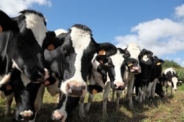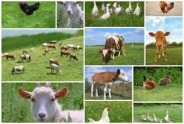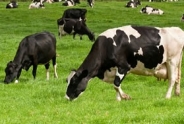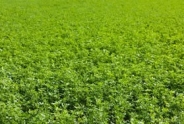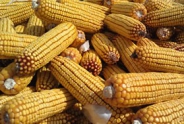Handling Heat Stress in Dairy Cows
Handling Heat Stress
by Margaret Quaassdorff, Dairy Management Specialist

What is heat stress?
Heat stress occurs when cows' bodies accumulate a heat load that they are unable to dissipate. It can be measured with the Temperature-Humidity Index (THI). The heat stress threshold for dairy cows is 68, with increasing numbers indicating the potential for negative impacts on cow performance.
Signs and Consequences of Heat Stress
- Physical signs of heat stress in dairy cows include reduced milk production, lethargic behavior, and reduced lying time.
- Moderate Heat Stress. Cows will have rapid shallow breathing, and be sweating to help dissipate heat. There will be notable (10%) decreases in milk production and feed intake, and milk components will be negatively affected.
- Severe Heat Stress. Cows will begin breathing open-mouthed and may be drooling and panting with the tongue hanging out. There will be a great (25% or more) decrease in milk production and feed intake.
- Other consequences related to heat stress:
- Higher somatic cell count may also be apparent as the cows' immune systems are negatively affected by stress hormones during the bouts of heat stress.
- Decreased conception rate over the summer months.
- Increased lameness in the early fall due to sole ulcers appearing about two months after heat stress events. High producing cows typically exhibit more signs of heat stress vs. lower producers as their intakes tend to be higher to match milk production. As the cow digests and metabolizes nutrients, heat is generated by the rumen and body, and cows may stand longer to increase surface area exposure to the environment to help dissipate heat.
- Death. Cows that may have experienced pneumonia earlier in life, older cows, or those with pre-existing health conditions may die as a result of the combined stressors due to the heat.
Steps to Reduce Heat Stress
- Provide cool fresh water in abundance for all cows lactating and dry. Water is the most important nutrient. Not only is it life sustaining and necessary for cooling, but milk consists of 87% water, which must be taken in by the cow before she can transform it. A lactating cow drinks about 30-50 gallons of water each day, but that amount can double in times of heat stress.
- Alleviate heat stress in the parlor holding area by adding sprinklers and fans. Enough water should be sprinkled to soak cows to the skin, and combined with constant fan speeds of 5-7mph to make evaporative cooling effective. The more comfortable cows are before milking, the better they will perform.
- Alleviate heat stress in cow housing with proper ventilation and heat abatement tools such as shade cloth, fans, positive pressure tube systems, baffles, and sprinklers. Make sure fresh air is reaching the cows where they are resting and eating.
- Increase the nutrient density of the ration. As cows eat less in the heat, make sure you are feeding high quality forages. It may also be prudent to work with your nutritionist to adjust the diet to contain more energy, and balanced minerals to better reflect true dry matter intakes and mineral losses. Free choice bicarb is a good idea to help offset the incidence of subacute ruminal acidosis. In addition, try to deliver feed during the coolest parts of the day to encourage cows to eat and ruminate.
Upcoming Events
Pasture Walk at C&H Farms of WNY, LLC
August 26, 2025
Akron, NY
C&H Farms is new to grazing beef cows. Come out to view, discuss, and learn what is working and what needs some adjusting.
Dairy Bovine Reproduction and Artificial Insemination Training Course en Espanol
October 14 - October 15, 2025
Join us for a two-day workshop with hands-on training that will be offered in Spanish in cooperation with Javier Cheang, Genex. Space is limited, register today!
Inaugural New York State Agritourism Conference
November 10 - November 11, 2025
Saratoga Springs, NY
SAVE THE DATE! Inaugural NEW YORK STATE AGRITOURISM CONFERENCE presented by Cornell Cooperative Extension Agritourism Program Work Team
Announcements
We're Hiring: Area Dairy Management Specialist
To apply:Please apply via Academic Jobs Online (https://academicjobsonline.org/ajo/jobs/30185).
Qualified candidates should submit a short cover letter, curriculum vitae, and contact information for three references.
Applications must be submitted by July 31, 2025.
For more information, please contact Peter Landre at ptl2@cornell.edu. Additional information about the Northwest New York Dairy, Livestock and Field Crops Team can be found at https://nwnyteam.cce.cornell.edu/.

